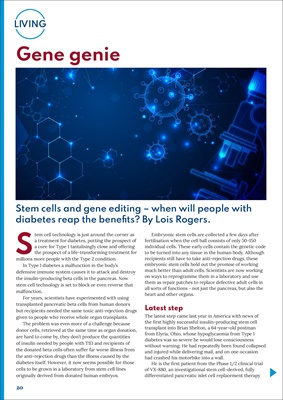
20
LIVING
Gene genie
Stem cells and gene editing - when will people with
diabetes reap the benefits? By Lois Rogers.
Stem cell technology is just around the corner as
a treatment for diabetes, putting the prospect of
a cure for Type 1 tantalisingly close and offering
the prospect of a life-transforming treatment for
millions more people with the Type 2 condition.
In Type 1 diabetes a malfunction in the body's
defensive immune system causes it to attack and destroy
the insulin-producing beta cells in the pancreas. Now
stem cell technology is set to block or even reverse that
malfunction.
For years, scientists have experimented with using
transplanted pancreatic beta cells from human donors
but recipients needed the same toxic anti-rejection drugs
given to people who receive whole organ transplants.
The problem was even more of a challenge because
donor cells, retrieved at the same time as organ donation,
are hard to come by, they don't produce the quantities of
insulin needed by people with T1D and recipients of the
donated beta cells often far worse illness from the antirejection
drugs than the illness caused by the diabetes
itself. However, it now seems possible for those cells to
be grown in a laboratory from stem cell lines originally
derived from donated human embryos.
Embryonic stem cells are collected a few days after
fertilisation when the cell ball consists of only 50-150
individual cells. These early cells contain the genetic code
to be turned into any tissue in the human body. Although
recipients still have to take anti-rejection drugs, these
embryonic stem cells hold out the promise of working
much better than adult cells. Scientists are now working
on ways to reprogramme them in a laboratory and use
them as repair patches to replace defective adult cells in
all sorts of functions - not just the pancreas, but also the
heart and other organs.
Latest step
The latest step came last year in America with news of
the first highly successful insulin-producing stem cell
transplant into Brian Shelton, a 64-year-old postman
from Elyria, Ohio, whose hypoglycaemia from Type 1
diabetes was so severe he would lose consciousness
without warning. He had repeatedly been found collapsed
and injured while delivering mail, and on one occasion
had crashed his motorbike into a wall.
He is the first patient from the Phase 1/2 clinical trial
of VX-880, an investigational stem cell-derived, fully
differentiated pancreatic islet cell replacement therapy